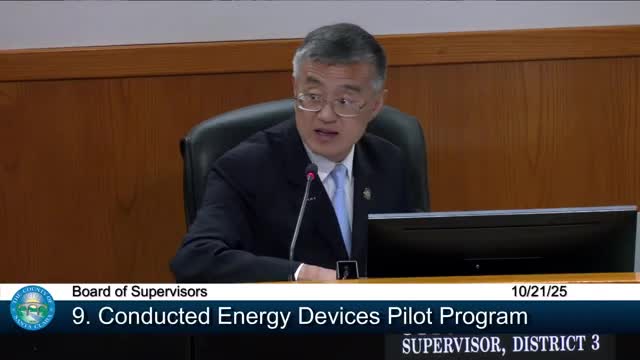Supervisors receive 6‑month CED report; ask sheriff for expansion plan, confidential briefings
Get AI-powered insights, summaries, and transcripts
Subscribe
Summary
After a six‑month pilot, the sheriff’s office reported limited deployments of conducted energy devices (CEDs) in county jails and recommended broader access. The board voted to accept the report, direct the sheriff to return with options for expanding the program and to provide confidential operational material to the board for review.
On Oct. 21 the Santa Clara County Board of Supervisors received a six‑month status report on the sheriff’s conducted energy device (CED, commonly called Taser) pilot and directed the sheriff to return with a plan for possible expansion and additional oversight information.
The pilot, launched March 31, 2025, placed 60 CEDs at the county’s main jail facilities and Elmwood. Sheriff’s office presenters said deputies and jail training officers received certification and crisis‑intervention training; the devices were deployed nine times in 252 use‑of‑force incidents reviewed during the reporting period. County and independent oversight reviewers told the board that in 39 unholstering incidents — about 56.5% of those instances — the device’s presence or display achieved compliance without the device being fired.
The sheriff’s team and the independent monitoring firm from Oakland told supervisors the devices were used in response to violent, assaultive behavior inside housing units where other options had been ineffective; presenters described specific incidents in which a CED deployment stopped assaults on staff or on other incarcerated people. The sheriff noted an overall upward trend in assaults and incidents involving weapons compared with prior years.
Public speakers and local civil‑rights groups strongly opposed broader CED use, citing national investigations tying Tasers to deaths and injuries and saying the devices are disproportionately deployed against people of color and people with mental‑health conditions. Speakers and community groups asked the board for transparency, release of video and medical records, and expansion of mental‑health and non‑police responses. Oakland’s monitor said its review found the nine deployments were consistent with the sheriff’s updated policies and that the devices changed the dynamics of some confrontations.
After discussion the board voted 3‑2 on a motion by Supervisor Abe Koga, seconded by President Lee, to accept the six‑month report and direct the sheriff to return with a plan outlining options for expanding CED access (including civilian‑custody and enforcement scenarios), a timeline for a competitive procurement(s), and a recommended oversight and reporting schedule. The motion also requested an off‑agenda confidential briefing for the board (to include videos and medical/incident records where legally permissible) and a further status update later in the pilot period.
Sheriff Johnson and training staff told the board the CEDs were not assigned to female or severely mentally ill housing units but that trained staff could respond to those areas if an incident met policy thresholds. Oakland’s monitor and the sheriff’s office both emphasized mandatory post‑deployment medical reviews and internal reporting up to the federal consent‑decree monitor.
Board members expressed divergent views: proponents said the devices can stop assaults quickly and reduce injuries; opponents cited legal risk, concerns about use on people in crisis and the need to prioritize mental‑health alternatives. The motion passed with three votes in favor and two opposed.
The board did not adopt a final policy change at the meeting; it directed the sheriff to return with more detailed proposals and required administration to coordinate confidentiality, legal review and community engagement around the proposed next steps.
